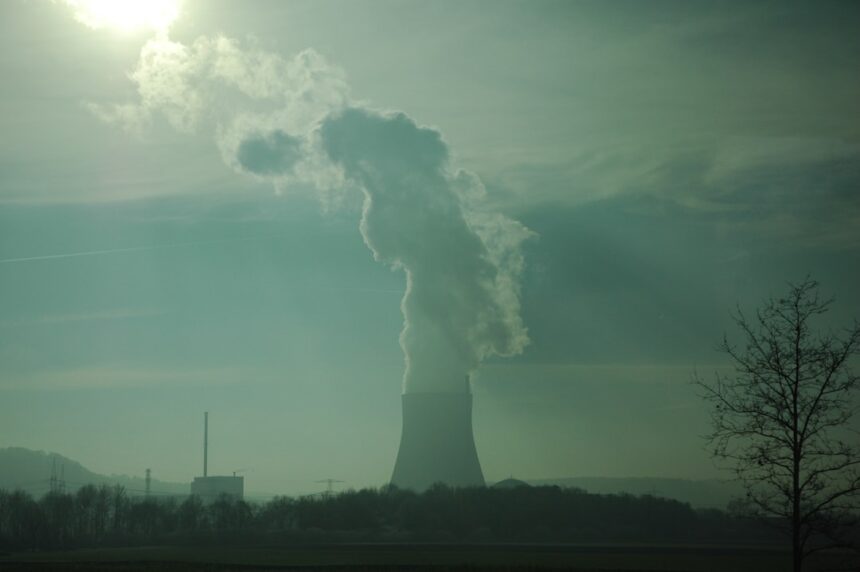The German nuclear program traces its roots back to the early 20th century, a time when the scientific community was beginning to unravel the mysteries of atomic structure. Pioneering physicists such as Max Planck and Albert Einstein laid the groundwork for modern physics, which would later influence nuclear research. The discovery of the neutron by James Chadwick in 1932 and the subsequent realization that nuclear fission could release vast amounts of energy sparked interest among German scientists.
By the late 1930s, the potential for harnessing nuclear energy for both peaceful and military purposes became increasingly apparent, leading to the establishment of formal research initiatives. In 1938, the discovery of nuclear fission by Otto Hahn and Fritz Strassmann marked a pivotal moment in the evolution of the German nuclear program. Their findings, which demonstrated that uranium atoms could be split to release energy, captured the attention of both scientists and military leaders.
The Nazi regime, eager to exploit this newfound knowledge for its own ends, began to invest resources into nuclear research. This marked the beginning of a concerted effort to develop nuclear technology, driven by a combination of scientific curiosity and militaristic ambition.
Key Takeaways
- The German nuclear program was initiated during World War II in response to the potential of nuclear weapons.
- Scientists and researchers played a crucial role in the development of the German nuclear program, with many leading physicists involved in the project.
- World War II had a significant influence on the German nuclear program, as the urgency to develop nuclear weapons intensified during the war.
- The race for nuclear weapons led to the creation of uranium and plutonium, key components in the development of nuclear arms.
- Allied efforts to disrupt the German nuclear program, including sabotage and espionage, had a significant impact on the program’s progress.
The Role of Scientists and Researchers
The German nuclear program was heavily reliant on the contributions of a diverse group of scientists and researchers, many of whom were at the forefront of their fields. Among them was Werner Heisenberg, a prominent physicist known for his work on quantum mechanics and uncertainty principles. Heisenberg’s involvement in the program was crucial, as he led efforts to understand the feasibility of creating a nuclear reactor and ultimately a bomb.
His intellectual prowess and leadership helped shape the direction of the research, although his motivations and loyalties have been subjects of debate among historians. In addition to Heisenberg, other notable figures such as Otto Hahn, Lise Meitner, and Carl Friedrich von Weizsäcker played significant roles in advancing nuclear research in Germany. Hahn’s expertise in radioactivity and Meitner’s contributions to understanding nuclear fission were instrumental in laying the scientific foundation for the program.
However, as the war progressed, many scientists faced moral dilemmas regarding their work. Some chose to remain in Germany, believing they could influence the program for good, while others fled to Allied nations, fearing the consequences of their research falling into the wrong hands.
The Influence of World War II on the Program

World War II had a profound impact on the trajectory of the German nuclear program. As the conflict escalated, resources were increasingly diverted towards military applications, and scientific research became intertwined with wartime objectives. The urgency to develop advanced weaponry led to heightened interest in nuclear technology, as both sides recognized its potential to alter the course of the war.
The German military viewed nuclear weapons as a means to secure victory, prompting further investment in research and development. However, the war also created significant challenges for the program. As Allied forces began to gain ground, Germany faced shortages of materials and manpower that hampered scientific progress.
The chaotic environment of wartime Germany made it difficult for researchers to collaborate effectively or access necessary resources. Despite these obstacles, some scientists remained committed to their work, driven by a sense of duty to their country and a belief in the importance of their research.
The Race for Nuclear Weapons
| Country | Year of First Test | Total Tests | Current Arsenal |
|---|---|---|---|
| United States | 1945 | 1,054 | 6,185 |
| Russia | 1949 | 715 | 6,375 |
| China | 1964 | 45 | 320 |
| United Kingdom | 1952 | 45 | 225 |
| France | 1960 | 210 | 300 |
| India | 1974 | 6 | 150 |
| Pakistan | 1998 | 2 | 160 |
| North Korea | 2006 | 6 | 40 |
The race for nuclear weapons during World War II was characterized by intense competition among various nations, with Germany initially positioned as a frontrunner. The potential for nuclear energy to be weaponized created a sense of urgency among military leaders and scientists alike. As news of successful experiments in nuclear fission spread, both Allied and Axis powers recognized that whoever could harness this power first would gain a significant strategic advantage.
In Germany, the race was marked by a combination of ambition and uncertainty. While scientists like Heisenberg were making strides in understanding nuclear reactions, there were also significant gaps in knowledge regarding how to create a functional weapon. The lack of coordination among researchers and competing priorities within the military further complicated efforts to develop a bomb.
Meanwhile, Allied nations were not idle; they were actively working on their own nuclear programs, most notably the Manhattan Project in the United States, which aimed to develop an atomic bomb before Germany could succeed.
The Creation of Uranium and Plutonium
The creation of uranium and plutonium was central to the development of nuclear weapons during World War
Uranium-235, a rare isotope found in natural uranium, was identified as a key material for sustaining a nuclear chain reaction. German scientists focused on enriching uranium through various methods, including gaseous diffusion and electromagnetic separation. However, these processes were complex and resource-intensive, requiring significant technological advancements that were not fully realized during the war.

Plutonium emerged as another critical element in the quest for nuclear weapons.
This discovery opened new avenues for weapon design but also presented challenges in terms of production and handling.
The complexities involved in creating both uranium and plutonium-based weapons highlighted the scientific hurdles that needed to be overcome before any nation could successfully deploy a functional atomic bomb.
The Allied Efforts to Disrupt the Program
As the German nuclear program progressed, Allied forces recognized the need to disrupt its development through targeted operations. One notable effort was Operation Alsos, which aimed to gather intelligence on German nuclear research and prevent any potential breakthroughs. Allied scientists and military personnel worked together to infiltrate German facilities and assess their capabilities.
This operation not only sought to sabotage ongoing research but also aimed to capture key scientists who could provide valuable information about Germany’s progress. Additionally, air raids targeted critical infrastructure associated with the German nuclear program. Facilities involved in uranium enrichment and research were bombed in an attempt to cripple their operations.
These efforts reflected a growing awareness among Allied leaders that preventing Germany from developing nuclear weapons was essential for ensuring victory in the war. The combination of intelligence gathering and direct action underscored the high stakes involved in this race against time.
The Impact of the German Nuclear Program on History
The German nuclear program had far-reaching implications for history, shaping not only the outcome of World War II but also influencing post-war geopolitics. Although Germany ultimately did not succeed in developing an atomic bomb before its defeat, the knowledge gained during this period laid the groundwork for future nuclear research worldwide. The lessons learned from Germany’s efforts informed subsequent programs in both Allied nations and adversaries during the Cold War.
Moreover, the existence of a German nuclear program raised questions about scientific responsibility and ethical considerations surrounding nuclear research. The potential consequences of nuclear weapons became increasingly apparent as nations grappled with their destructive capabilities. The legacy of Germany’s pursuit of atomic power served as a cautionary tale about the intersection of science and warfare, prompting discussions about regulation and oversight in scientific endeavors.
The Legacy of the Program
The legacy of the German nuclear program is multifaceted, encompassing both scientific advancements and moral dilemmas that continue to resonate today. On one hand, it contributed significantly to advancements in nuclear physics and technology; many concepts developed during this time laid foundational principles for modern nuclear energy applications. On the other hand, it serves as a stark reminder of how scientific inquiry can be co-opted for destructive purposes.
In post-war Europe, many former German scientists found themselves at a crossroads as they navigated their roles in a world increasingly wary of nuclear proliferation. Some chose to continue their work in peaceful applications of nuclear energy, while others faced scrutiny for their past affiliations with a regime that sought to weaponize their discoveries. This duality reflects an ongoing struggle within scientific communities regarding ethical responsibilities and accountability.
The Ethical and Moral Implications of Nuclear Weapons
The ethical and moral implications surrounding nuclear weapons are profound and complex. The development of such weapons raises fundamental questions about humanity’s capacity for destruction and responsibility towards future generations. The German nuclear program exemplifies how scientific advancements can be harnessed for both beneficial and harmful purposes; while it aimed at harnessing atomic energy for national pride and military superiority, it also highlighted the potential consequences of unchecked ambition.
As nations grapple with their own nuclear arsenals today, discussions about disarmament and non-proliferation remain critical. The legacy of Germany’s pursuit serves as a reminder that scientific progress must be accompanied by ethical considerations; researchers must weigh their contributions against potential ramifications on global security and human welfare.
The Aftermath of the German Nuclear Program
In the aftermath of World War II, Germany’s failed attempts at developing an atomic bomb had significant repercussions on international relations and scientific collaboration. The division between East and West further complicated discussions about nuclear technology; while West Germany aligned itself with NATO powers advocating for peaceful uses of atomic energy, East Germany found itself under Soviet influence with differing priorities regarding military capabilities. The dismantling of Nazi-era research institutions led to a re-evaluation of scientific practices within Germany itself.
This period marked a turning point where science began to prioritize ethical considerations alongside technological advancements.
Lessons Learned from the German Nuclear Program
The lessons learned from the German nuclear program are invaluable for contemporary society as it navigates an increasingly complex global landscape marked by technological advancements and geopolitical tensions. One key takeaway is the importance of transparency and collaboration within scientific communities; fostering open dialogue can help mitigate risks associated with secretive research agendas driven by nationalistic ambitions. Additionally, there is an urgent need for robust regulatory frameworks governing scientific inquiry related to potentially dangerous technologies.
As history has shown, unchecked ambition can lead to catastrophic consequences; therefore, establishing ethical guidelines is essential for ensuring that scientific progress aligns with humanitarian values. Ultimately, reflecting on Germany’s pursuit of nuclear power serves as both a cautionary tale and an opportunity for growth; it underscores humanity’s responsibility to harness knowledge wisely while remaining vigilant against its potential misuse.
The German nuclear program during World War II was a significant yet ultimately unsuccessful effort to develop nuclear weapons. This program, led by prominent physicists such as Werner Heisenberg, faced numerous challenges, including resource shortages and strategic missteps. For a deeper understanding of the context and implications of the German nuclear program in 1945, you can explore a related article on the topic by visiting this page. This article provides insights into the scientific endeavors and geopolitical dynamics of the era, shedding light on why the program did not achieve its intended goals.
WATCH THIS! 🪖How Stolen Nazis Built Cold War Power
FAQs
What was the German nuclear program in 1945?
The German nuclear program in 1945 refers to the efforts by Nazi Germany to develop nuclear weapons during World War II.
When did the German nuclear program begin?
The German nuclear program began in the 1930s, with the discovery of nuclear fission by German chemists Otto Hahn and Fritz Strassmann in 1938.
What was the status of the German nuclear program in 1945?
By 1945, the German nuclear program had made significant progress but had not yet developed a functional nuclear weapon. The program was hindered by resource shortages, technical challenges, and the Allied bombing campaign.
Why did the German nuclear program ultimately fail?
The German nuclear program ultimately failed due to a combination of factors, including the loss of key scientists to emigration and conscription, resource shortages, and the Allied bombing campaign targeting German industrial and research facilities.
What was the impact of the German nuclear program on the outcome of World War II?
The German nuclear program did not have a significant impact on the outcome of World War II, as the Allied forces were able to develop their own nuclear weapons and ultimately defeat Nazi Germany before it could successfully deploy a nuclear weapon.




